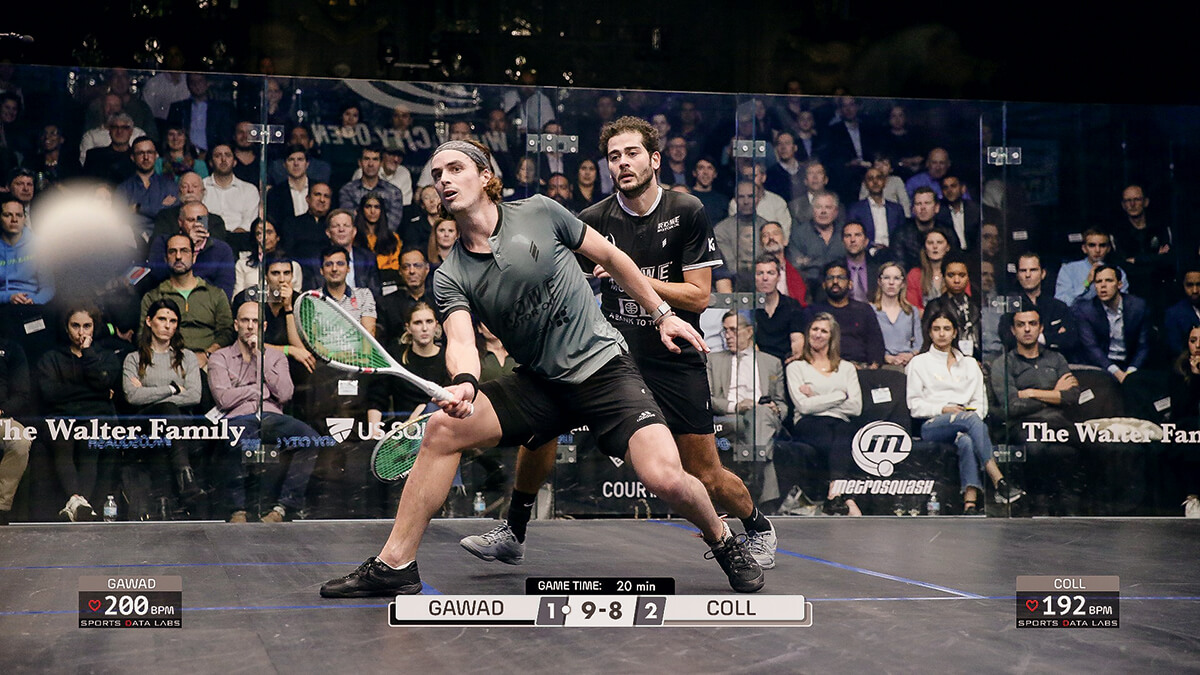lens
A New Field in Sports
Law students explore the rights and limits of using athlete-performance data
 PHOTO: COURTESY OF SPORTS DATA LABSTop squash players Paul Coll, left, of New Zealand, and Karim Abdel Gawad, of Egypt, competed at a Professional Squash Association World Tour event in Chicago.
PHOTO: COURTESY OF SPORTS DATA LABSTop squash players Paul Coll, left, of New Zealand, and Karim Abdel Gawad, of Egypt, competed at a Professional Squash Association World Tour event in Chicago.Their heart rates, monitored by Sports Data Labs, were included as part of the broadcast to add to the drama.
Imagine the scene: It's a Monday Night Football game, and just seconds remain as the kicker runs out for what could be the game-winning field goal.
The fans are nervous. But the kicker is brimming with confidence. He is consistent and steely, with a heart rate and blood pressure that rarely rise in a clutch. That kind of biometric data can be measured in real time and has significant value for athletes and their teams—not to mention broadcasters describing the unfolding drama and betting companies offering wagers.
Now Sports Data Labs (SDL)—a Detroit-area company founded by two Case Western Reserve alumni—collects, analyzes and distributes such physiological and biomechanical performance data. It has teamed with CWRU's School of Law. Students will explore key legal issues that could help unlock opportunities for using the data.
Mark Gorski, JD (LAW '07), and Stan Mimoto, JD (LAW '08, MGT '08), founded the company in 2015, recognizing that such data is an asset with commercial value.
SDL uses wearable technology, optical trackers and other sensing systems to collect real-time information with players' consent. Such data has been distributed to organizations from the PGA Tour to broadcasters, including CBS Sports, Fox Sports and Eurosport, Gorski said.
Last year, SDL and the NFL Players Association (NFLPA) announced the NFLPA had taken an ownership stake in the company and launched a partnership to monetize opportunities for NFL players by collecting and using their performance data.
The CWRU law students' first priority is writing a series of in-depth reports. They will summarize and analyze laws around the globe that relate to using biometric data in the context of intellectual property, privacy issues and athletes' rights to their image and name, said Craig Nard, JD, JSD, the Galen J. Roush Professor of Law, who directs the law school's Spangenberg Center for Law, Technology, and the Arts.
Nard said students are exploring uncharted legal issues. He expects what they learn could help athletes and leagues understand rights and limitations, bolster contract proposals and expand ways to create financial value from athletes' personal data.
"Our students will be at the forefront of this burgeoning field of law," Nard said.





